Unit 9 Learning Grammar 课件(共23张)2024-2025学年高一英语北师版(2019)必修第三册
文档属性
| 名称 | Unit 9 Learning Grammar 课件(共23张)2024-2025学年高一英语北师版(2019)必修第三册 | 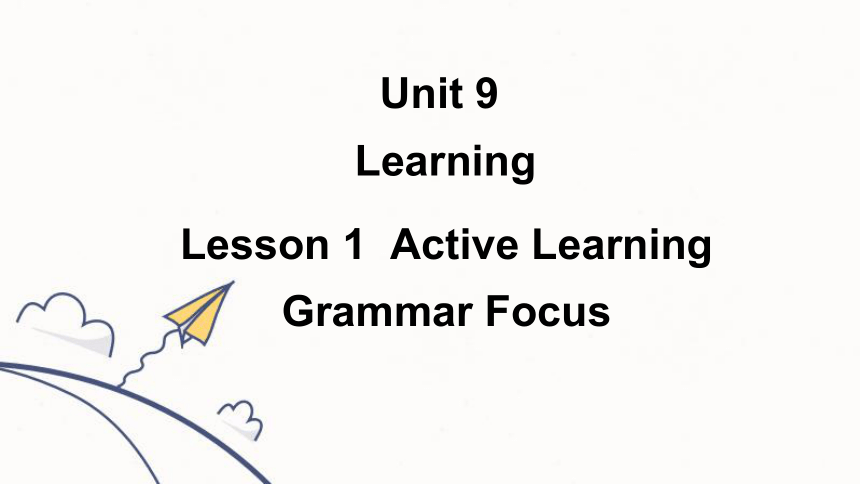 | |
| 格式 | pptx | ||
| 文件大小 | 2.5MB | ||
| 资源类型 | 教案 | ||
| 版本资源 | 北师大版(2019) | ||
| 科目 | 英语 | ||
| 更新时间 | 2025-04-29 21:29:10 | ||
图片预览

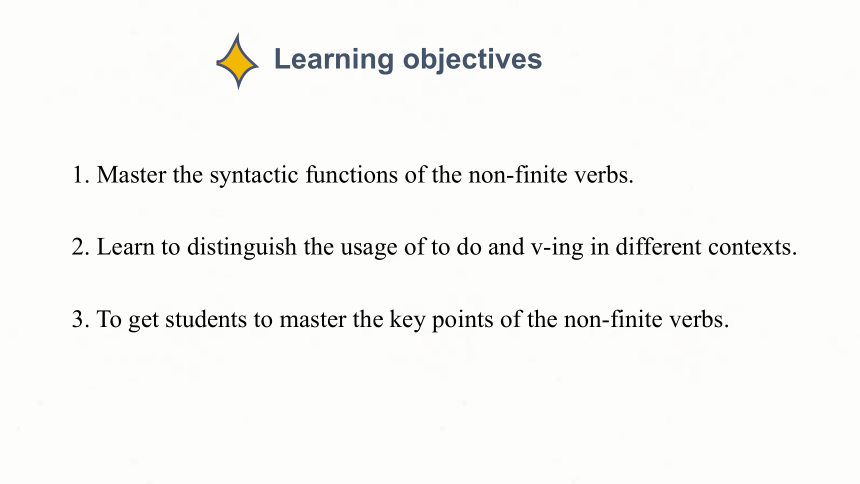
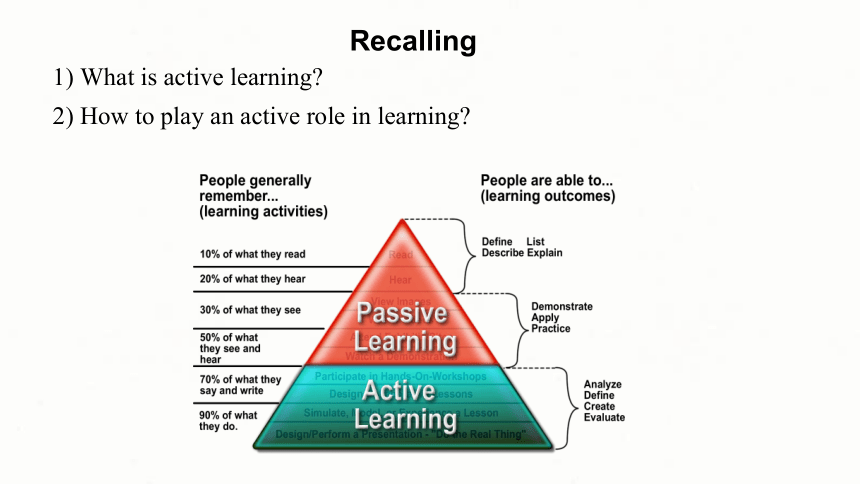
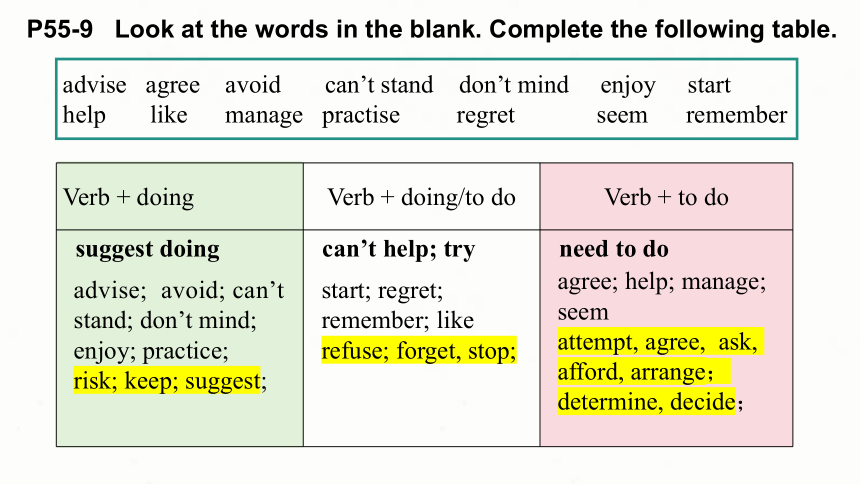
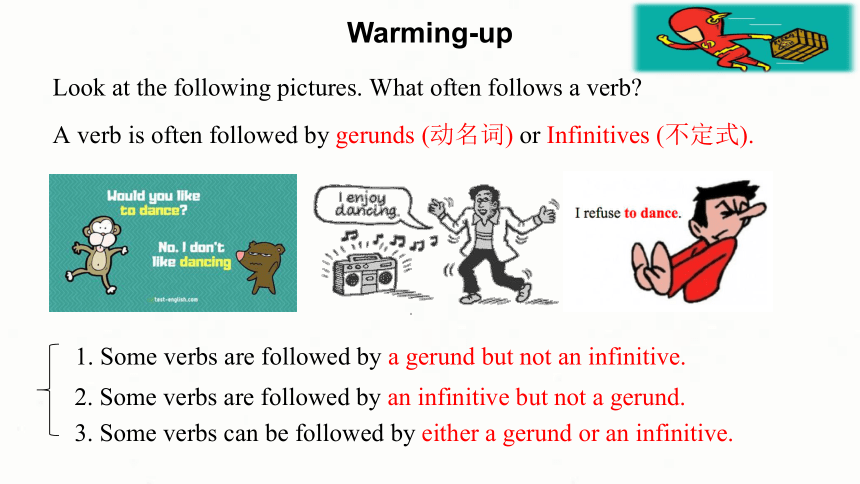
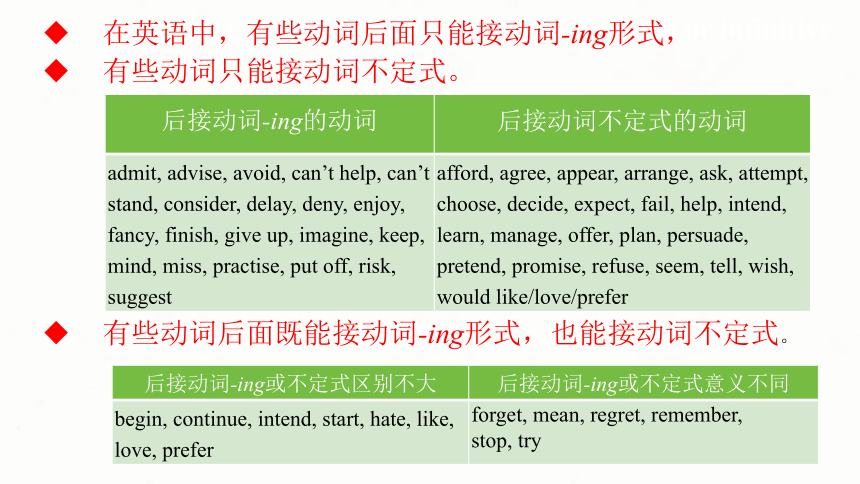
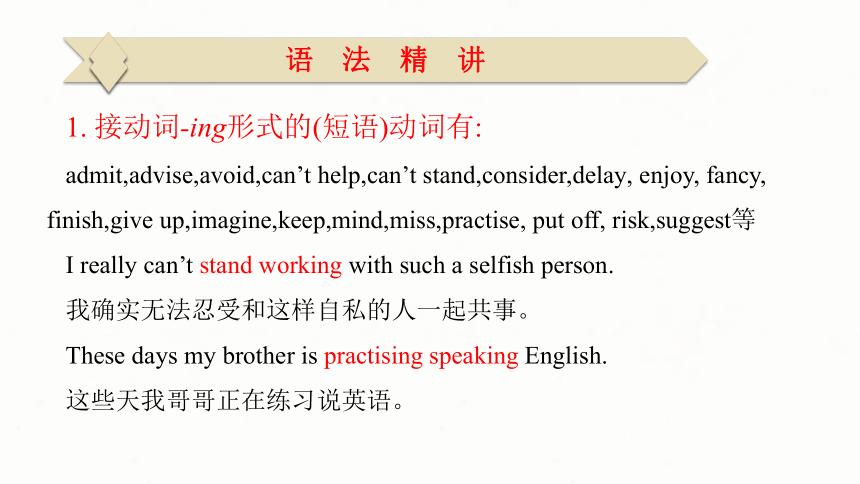
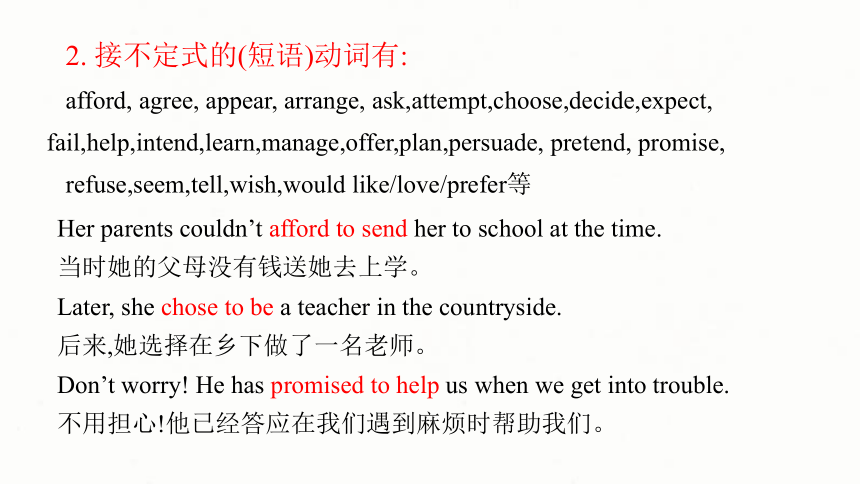
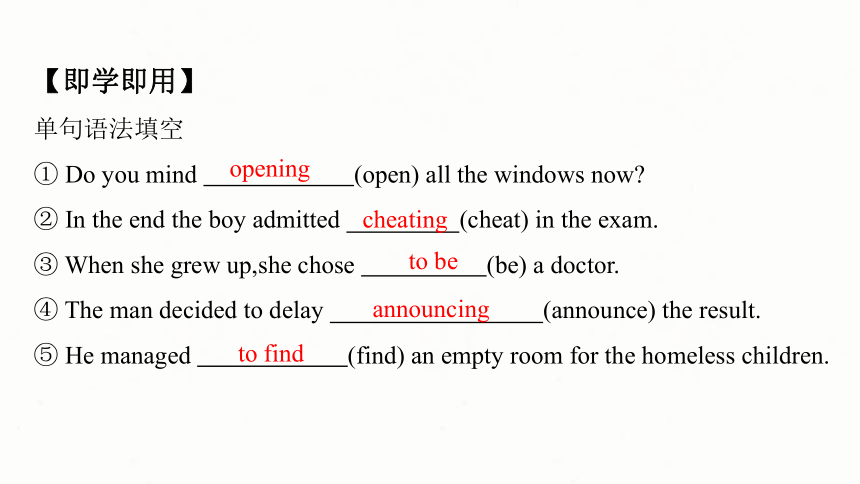
文档简介
(共23张PPT)
Unit 9
Learning
Lesson 1 Active Learning
Grammar Focus
1. Master the syntactic functions of the non-finite verbs.
2. Learn to distinguish the usage of to do and v-ing in different contexts.
3. To get students to master the key points of the non-finite verbs.
Learning objectives
Recalling
1) What is active learning
2) How to play an active role in learning
Verb + doing Verb + doing/to do Verb + to do
suggest doing can’t help; try need to do
P55-9 Look at the words in the plete the following table.
advise agree avoid can’t stand don’t mind enjoy start
help like manage practise regret seem remember
advise; avoid; can’t stand; don’t mind;
enjoy; practice;
risk; keep; suggest;
agree; help; manage; seem
attempt, agree, ask,
afford, arrange;determine, decide;
start; regret; remember; like
refuse; forget, stop;
1. Some verbs are followed by a gerund but not an infinitive.
A verb is often followed by gerunds (动名词) or Infinitives (不定式).
2. Some verbs are followed by an infinitive but not a gerund.
3. Some verbs can be followed by either a gerund or an infinitive.
Look at the following pictures. What often follows a verb
Warming-up
Grammar—Verbs followed by verb-ing form or infinitive
后接动词-ing的动词 后接动词不定式的动词
admit, advise, avoid, can’t help, can’t stand, consider, delay, deny, enjoy, fancy, finish, give up, imagine, keep, mind, miss, practise, put off, risk, suggest afford, agree, appear, arrange, ask, attempt, choose, decide, expect, fail, help, intend, learn, manage, offer, plan, persuade, pretend, promise, refuse, seem, tell, wish, would like/love/prefer
在英语中,有些动词后面只能接动词-ing形式,
有些动词只能接动词不定式。
有些动词后面既能接动词-ing形式,也能接动词不定式。
后接动词-ing或不定式区别不大 后接动词-ing或不定式意义不同
begin, continue, intend, start, hate, like, love, prefer forget, mean, regret, remember,
stop, try
语 法 精 讲
1. 接动词-ing形式的(短语)动词有:
admit,advise,avoid,can’t help,can’t stand,consider,delay, enjoy, fancy, finish,give up,imagine,keep,mind,miss,practise, put off, risk,suggest等
I really can’t stand working with such a selfish person.
我确实无法忍受和这样自私的人一起共事。
These days my brother is practising speaking English.
这些天我哥哥正在练习说英语。
2. 接不定式的(短语)动词有:
afford, agree, appear, arrange, ask,attempt,choose,decide,expect, fail,help,intend,learn,manage,offer,plan,persuade, pretend, promise,
refuse,seem,tell,wish,would like/love/prefer等
Her parents couldn’t afford to send her to school at the time.
当时她的父母没有钱送她去上学。
Later, she chose to be a teacher in the countryside.
后来,她选择在乡下做了一名老师。
Don’t worry! He has promised to help us when we get into trouble.
不用担心!他已经答应在我们遇到麻烦时帮助我们。
【即学即用】
单句语法填空
① Do you mind (open) all the windows now
② In the end the boy admitted (cheat) in the exam.
③ When she grew up,she chose (be) a doctor.
④ The man decided to delay (announce) the result.
⑤ He managed (find) an empty room for the homeless children.
opening
cheating
to be
announcing
to find
3. Grammar—Verbs followed by verb-ing form or infinitive
remember to do sth = You remember things that you have to do later. 记着要去做某件事
He didn’t remember to check it out. 他不记得要去查看一下。
remember doing sth = You remember that you did sth earlier. 记得曾做过某件事
Do you remember seeing him there 你记得在那儿见过他吗
regret to do sth = You feel sorry before you do sth. 做某事前,感觉遗憾、惋惜
I regret to say that the meeting wasn’t successful. 我很遗憾地说,这次会议不成功。
regret doing sth = You do sth and then feel sorry about it. 做了某事后,感到懊悔
She regrets mentioning it to me. 她后悔向我提及此事。
后接动词-ing或不定式意义不同的部分动词辨析:
Grammar Summary
Word + -ing + to-infinitive
go on Although she asked him to stop, he went on tapping his pen on the table. After the interval, Pavarotti went on to sing an aria from Tosca.
stop They stopped laughing when Malcolm walked into the room She stopped to make a cup of tea.
remember I remember going to the bank, but nothing after that. Remember to take your hat when you go out.
forget He forgot washing the car. He forgot to take the car key with him.
regret It’s too late now, but I’ll always regret asking John to do the work. I regret to inform you that your application has been unsuccessful.
Translate the sentences. Summarize the meaning of “doing” and “to do”.
后悔做过某事
忘记做过某事
接着做在做的事
停下在做的事
记得做过某事
停下某事去做另一事
停下来要去做某事(目的)
记得要去做某事
遗憾地要去做某事
忘了去做某事
try to do sth. 努力做某事
try doing sth. 尝试做某事
I tried to get the fridge through the door, but it was too big and I hurt my waist.
I tried taking some aspirin, but the pain didn’t go away.
Grammar Summary
Missing this train means waiting for another hour.
I meant to give you this book today, but I forgot.
mean doing 意味着
mean to do = plan to do 打算
Grammar Summary
They like singing.
They don’t like to sing this time.
doing 表长期的
to do 表暂时、一次性
Grammar Summary
How old were you when you first started playing the piano
I start to understand the truth.
The snow started to melt.
doing表示开始一项长期活动或开始一种习惯时
to后接know, understand, realize这类表示心理状态或精神活动的动词
物作主语时,用start to do sth.
Grammar Summary
【即学即用】
翻译句子
①很遗憾地告诉你,你被解雇了。
②我记得被我父母带到公园的事情。
I regret to tell you that you have been fired.
③很抱歉,但是我的本意并不是要伤害你。
④不要忘记在周末给你父母写信。
I’m sorry,but I didn’t mean to harm you.
Don’t forget to write to your parents at weekends.
I remember being taken to the park by my parents.
无论是普通介词还是含介词的动词短语,一般情况下要用v.-ing(动名词)形式作宾语。
If you insist on doing something,do it every day.
如果你坚持做某件事,那就每天做。
After finishing his share of the work,he went to help the others.
他完成了自己的那部分工作以后,又去帮助别人。
1.to既可以作介词,又可以作不定式符号,因此要牢记含介词to的常用短语。
含介词to的短语
be used to(习惯于) be accustomed(习惯于)
be opposed to(反对) object to(反对)
动 名 词 作 介 词 的 宾 语
lead to(导致) be devoted to(献身于) doing
come close to(差不多) stick to(坚持,坚守) get down to(着手) pay attention to(注意) reduce sb./sth. to(使沦为)
2.可将介词in 省略的短语、句型
spend.. (in ) doing had no difficulty (in) doing have a...time (in) doing
I had no difficulty (in) making myself understood .
动 名 词 作 介 词 的 宾 语
不定式作动词(词组)tell,show,understand,explain, teach, learn, advise,discuss, ask,decide,wonder,find out等的宾语时,前面常带疑问词 how,what,whether,where, when, who 等,但why 后加不带 to 的不定式。
注意: 此用法中的不定式的逻辑主语需与句子的主语或宾语保持一致,否则用宾语从句。
He showed us how to do the work.(=He showed us how we should do the work.)
“疑问词+不定式”结构作宾语
Recently, I’ve managed _________ (become) a more active learner. When I’m reading a book or listening to my teacher, I try _______ (forget) what I’ve learnt before or what I think about the book or the person giving me the information and practice __________(concentrate) on the information itself. At the beginning, I found it difficult to do this and I couldn’t help __________(question) the ideas I was reading or hearing. But now I’ve learnt to avoid ______ (listen) to my inner voice all the time and sometimes I even argue with it. On the other hand, I also attempt _____ (ask) as many questions as I can. I ask my teachers a lot of questions and I’ve noticed that the answers to the questions have really helped me understand the topic a lot better.
to become
to ask
concentrating
to forget
listening
questioning
Complete the text with the correct form of the verbs in brackets.
Practice
avoid, bear, consider, deny, detest, dislike, endure, enjoy, imagine, involve, mention, mind, miss, practice, resent, risk, suggest, postpone, stand (忍受)
All of the following verbs should be followed by doing. Write a short paragraph/passage about active learning using the words given.
Practice
5 a agree, ask, afford, arrange, attempt
4 d dare, demand, determine, decide
4 p plan, pretend, promise, prepare
3 w, h, c want, wish, wait; hope, help, hesitate; care, choose, consent
2 l, b learn, long; beg, bear
r, o, u m, e refuse, offer, undertake, manage, expect
All of the following verbs should be followed by (sb.) to do. Write a short paragraph about active learning using the words given.
Practice
Reflect on what you have learnt about active learning.
Write a summary of the text and your reflections on it.
Homework
Unit 9
Learning
Lesson 1 Active Learning
Grammar Focus
1. Master the syntactic functions of the non-finite verbs.
2. Learn to distinguish the usage of to do and v-ing in different contexts.
3. To get students to master the key points of the non-finite verbs.
Learning objectives
Recalling
1) What is active learning
2) How to play an active role in learning
Verb + doing Verb + doing/to do Verb + to do
suggest doing can’t help; try need to do
P55-9 Look at the words in the plete the following table.
advise agree avoid can’t stand don’t mind enjoy start
help like manage practise regret seem remember
advise; avoid; can’t stand; don’t mind;
enjoy; practice;
risk; keep; suggest;
agree; help; manage; seem
attempt, agree, ask,
afford, arrange;determine, decide;
start; regret; remember; like
refuse; forget, stop;
1. Some verbs are followed by a gerund but not an infinitive.
A verb is often followed by gerunds (动名词) or Infinitives (不定式).
2. Some verbs are followed by an infinitive but not a gerund.
3. Some verbs can be followed by either a gerund or an infinitive.
Look at the following pictures. What often follows a verb
Warming-up
Grammar—Verbs followed by verb-ing form or infinitive
后接动词-ing的动词 后接动词不定式的动词
admit, advise, avoid, can’t help, can’t stand, consider, delay, deny, enjoy, fancy, finish, give up, imagine, keep, mind, miss, practise, put off, risk, suggest afford, agree, appear, arrange, ask, attempt, choose, decide, expect, fail, help, intend, learn, manage, offer, plan, persuade, pretend, promise, refuse, seem, tell, wish, would like/love/prefer
在英语中,有些动词后面只能接动词-ing形式,
有些动词只能接动词不定式。
有些动词后面既能接动词-ing形式,也能接动词不定式。
后接动词-ing或不定式区别不大 后接动词-ing或不定式意义不同
begin, continue, intend, start, hate, like, love, prefer forget, mean, regret, remember,
stop, try
语 法 精 讲
1. 接动词-ing形式的(短语)动词有:
admit,advise,avoid,can’t help,can’t stand,consider,delay, enjoy, fancy, finish,give up,imagine,keep,mind,miss,practise, put off, risk,suggest等
I really can’t stand working with such a selfish person.
我确实无法忍受和这样自私的人一起共事。
These days my brother is practising speaking English.
这些天我哥哥正在练习说英语。
2. 接不定式的(短语)动词有:
afford, agree, appear, arrange, ask,attempt,choose,decide,expect, fail,help,intend,learn,manage,offer,plan,persuade, pretend, promise,
refuse,seem,tell,wish,would like/love/prefer等
Her parents couldn’t afford to send her to school at the time.
当时她的父母没有钱送她去上学。
Later, she chose to be a teacher in the countryside.
后来,她选择在乡下做了一名老师。
Don’t worry! He has promised to help us when we get into trouble.
不用担心!他已经答应在我们遇到麻烦时帮助我们。
【即学即用】
单句语法填空
① Do you mind (open) all the windows now
② In the end the boy admitted (cheat) in the exam.
③ When she grew up,she chose (be) a doctor.
④ The man decided to delay (announce) the result.
⑤ He managed (find) an empty room for the homeless children.
opening
cheating
to be
announcing
to find
3. Grammar—Verbs followed by verb-ing form or infinitive
remember to do sth = You remember things that you have to do later. 记着要去做某件事
He didn’t remember to check it out. 他不记得要去查看一下。
remember doing sth = You remember that you did sth earlier. 记得曾做过某件事
Do you remember seeing him there 你记得在那儿见过他吗
regret to do sth = You feel sorry before you do sth. 做某事前,感觉遗憾、惋惜
I regret to say that the meeting wasn’t successful. 我很遗憾地说,这次会议不成功。
regret doing sth = You do sth and then feel sorry about it. 做了某事后,感到懊悔
She regrets mentioning it to me. 她后悔向我提及此事。
后接动词-ing或不定式意义不同的部分动词辨析:
Grammar Summary
Word + -ing + to-infinitive
go on Although she asked him to stop, he went on tapping his pen on the table. After the interval, Pavarotti went on to sing an aria from Tosca.
stop They stopped laughing when Malcolm walked into the room She stopped to make a cup of tea.
remember I remember going to the bank, but nothing after that. Remember to take your hat when you go out.
forget He forgot washing the car. He forgot to take the car key with him.
regret It’s too late now, but I’ll always regret asking John to do the work. I regret to inform you that your application has been unsuccessful.
Translate the sentences. Summarize the meaning of “doing” and “to do”.
后悔做过某事
忘记做过某事
接着做在做的事
停下在做的事
记得做过某事
停下某事去做另一事
停下来要去做某事(目的)
记得要去做某事
遗憾地要去做某事
忘了去做某事
try to do sth. 努力做某事
try doing sth. 尝试做某事
I tried to get the fridge through the door, but it was too big and I hurt my waist.
I tried taking some aspirin, but the pain didn’t go away.
Grammar Summary
Missing this train means waiting for another hour.
I meant to give you this book today, but I forgot.
mean doing 意味着
mean to do = plan to do 打算
Grammar Summary
They like singing.
They don’t like to sing this time.
doing 表长期的
to do 表暂时、一次性
Grammar Summary
How old were you when you first started playing the piano
I start to understand the truth.
The snow started to melt.
doing表示开始一项长期活动或开始一种习惯时
to后接know, understand, realize这类表示心理状态或精神活动的动词
物作主语时,用start to do sth.
Grammar Summary
【即学即用】
翻译句子
①很遗憾地告诉你,你被解雇了。
②我记得被我父母带到公园的事情。
I regret to tell you that you have been fired.
③很抱歉,但是我的本意并不是要伤害你。
④不要忘记在周末给你父母写信。
I’m sorry,but I didn’t mean to harm you.
Don’t forget to write to your parents at weekends.
I remember being taken to the park by my parents.
无论是普通介词还是含介词的动词短语,一般情况下要用v.-ing(动名词)形式作宾语。
If you insist on doing something,do it every day.
如果你坚持做某件事,那就每天做。
After finishing his share of the work,he went to help the others.
他完成了自己的那部分工作以后,又去帮助别人。
1.to既可以作介词,又可以作不定式符号,因此要牢记含介词to的常用短语。
含介词to的短语
be used to(习惯于) be accustomed(习惯于)
be opposed to(反对) object to(反对)
动 名 词 作 介 词 的 宾 语
lead to(导致) be devoted to(献身于) doing
come close to(差不多) stick to(坚持,坚守) get down to(着手) pay attention to(注意) reduce sb./sth. to(使沦为)
2.可将介词in 省略的短语、句型
spend.. (in ) doing had no difficulty (in) doing have a...time (in) doing
I had no difficulty (in) making myself understood .
动 名 词 作 介 词 的 宾 语
不定式作动词(词组)tell,show,understand,explain, teach, learn, advise,discuss, ask,decide,wonder,find out等的宾语时,前面常带疑问词 how,what,whether,where, when, who 等,但why 后加不带 to 的不定式。
注意: 此用法中的不定式的逻辑主语需与句子的主语或宾语保持一致,否则用宾语从句。
He showed us how to do the work.(=He showed us how we should do the work.)
“疑问词+不定式”结构作宾语
Recently, I’ve managed _________ (become) a more active learner. When I’m reading a book or listening to my teacher, I try _______ (forget) what I’ve learnt before or what I think about the book or the person giving me the information and practice __________(concentrate) on the information itself. At the beginning, I found it difficult to do this and I couldn’t help __________(question) the ideas I was reading or hearing. But now I’ve learnt to avoid ______ (listen) to my inner voice all the time and sometimes I even argue with it. On the other hand, I also attempt _____ (ask) as many questions as I can. I ask my teachers a lot of questions and I’ve noticed that the answers to the questions have really helped me understand the topic a lot better.
to become
to ask
concentrating
to forget
listening
questioning
Complete the text with the correct form of the verbs in brackets.
Practice
avoid, bear, consider, deny, detest, dislike, endure, enjoy, imagine, involve, mention, mind, miss, practice, resent, risk, suggest, postpone, stand (忍受)
All of the following verbs should be followed by doing. Write a short paragraph/passage about active learning using the words given.
Practice
5 a agree, ask, afford, arrange, attempt
4 d dare, demand, determine, decide
4 p plan, pretend, promise, prepare
3 w, h, c want, wish, wait; hope, help, hesitate; care, choose, consent
2 l, b learn, long; beg, bear
r, o, u m, e refuse, offer, undertake, manage, expect
All of the following verbs should be followed by (sb.) to do. Write a short paragraph about active learning using the words given.
Practice
Reflect on what you have learnt about active learning.
Write a summary of the text and your reflections on it.
Homework
同课章节目录
- Unit 7 Art
- Lesson 1 Masterpieces
- Lesson 2 Beijing Opera
- Lesson 3 A Musical Genius
- Unit 8 Green living
- Lesson 1 Roots and Shoots
- Lesson 2 Greening the Desert
- Lesson 3 "White Bikes" on the Road
- Unit 9 Learning
- Lesson 1 Active Learning
- Lesson 2 Language Learning Tips
- Lesson 3 The Secrets of Your Memory
